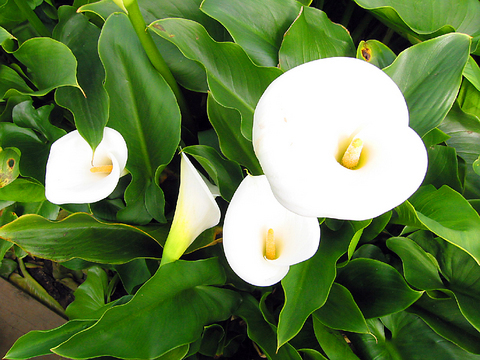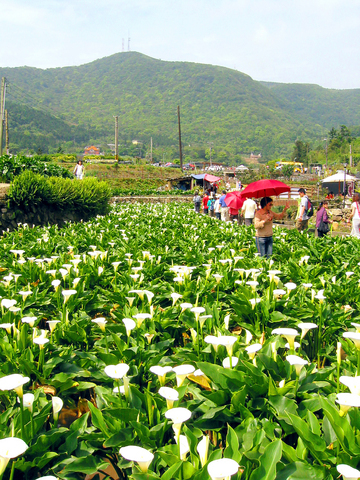Of the millions of calla lilies produced in Taiwan each year, more than half grow on farms near Bamboo Lake (Zhuzihu,
Traffic problems aside, it's hard to imagine a better setting for wholesome family entertainment so close to Taipei. Most come to pick bunches of the long-stemmed calla lilies, a relative of the taro that thrives in the cooler mountain climate. Others come to watch their children look for tadpoles in the muddy furrows or chase butterflies through the fields.
"It's like another world," said Hung Yi-wen (

"It's so romantic," sighed Cindy Chen, a college student who was visiting for the first time. She came to escape the bustle of the city and breathe the mountain air. This year's calla lily festival winds up this weekend and offers a variety of activities, including a photography contest, guided ecological tours and mini concerts.
Last year the event drew half a million visitors, according to the Beitou Farmer's Association and Taipei City government. Organizers expect a similar number to attend this year.
"We have so many visitors I can't even count them," said Mrs. Cheng , who runs the Trail Calla Lily Garden (

PHOTOS: RON BROWNLOW, TAIPEI TIMES
Like most establishments, Cheng's serves drinks on a shady patio and charges NT$100 per person for entry. Here, the fee allows visitors to pick a bunch of 10 flowers. Cheng also sells individual flowers for NT$10 from a roadside stand.
The government encourages visitors to take public transportation up the mountain during the calla lily festival. Although several buses stop near Zhuzihu Road, a circular route that connects the calla lily farms, only the Small No. 9 (
Nestled between Datun (
Outside Mau-bang Garden (
"We grow about 400,000 flowers a year," Gao said. To his right, a television played an instructional video on how to pick calla lilies. Gao said a flower picked in cooler weather can last up to 20 days at home. Trim the stalk every day and put it in a vase filled with a few ice cubes and several centimeters of water.
Some of the farms remain open after the official end of cally lily season. Goa said Mau-bang Garden closes in May and reopens from July to September for sunflower season.
To get there take the MRT to Beitou Station and transfer to the Small 9 bus.

Growing up in a rural, religious community in western Canada, Kyle McCarthy loved hockey, but once he came out at 19, he quit, convinced being openly gay and an active player was untenable. So the 32-year-old says he is “very surprised” by the runaway success of Heated Rivalry, a Canadian-made series about the romance between two closeted gay players in a sport that has historically made gay men feel unwelcome. Ben Baby, the 43-year-old commissioner of the Toronto Gay Hockey Association (TGHA), calls the success of the show — which has catapulted its young lead actors to stardom -- “shocking,” and says

The People’s Republic of China (PRC) invaded Vietnam in 1979, following a year of increasingly tense relations between the two states. Beijing viewed Vietnam’s close relations with Soviet Russia as a threat. One of the pretexts it used was the alleged mistreatment of the ethnic Chinese in Vietnam. Tension between the ethnic Chinese and governments in Vietnam had been ongoing for decades. The French used to play off the Vietnamese against the Chinese as a divide-and-rule strategy. The Saigon government in 1956 compelled all Vietnam-born Chinese to adopt Vietnamese citizenship. It also banned them from 11 trades they had previously

Inside an ordinary-looking townhouse on a narrow road in central Kaohsiung, Tsai A-li (蔡阿李) raised her three children alone for 15 years. As far as the children knew, their father was away working in the US. They were kept in the dark for as long as possible by their mother, for the truth was perhaps too sad and unjust for their young minds to bear. The family home of White Terror victim Ko Chi-hua (柯旗化) is now open to the public. Admission is free and it is just a short walk from the Kaohsiung train station. Walk two blocks south along Jhongshan

As devices from toys to cars get smarter, gadget makers are grappling with a shortage of memory needed for them to work. Dwindling supplies and soaring costs of Dynamic Random Access Memory (DRAM) that provides space for computers, smartphones and game consoles to run applications or multitask was a hot topic behind the scenes at the annual gadget extravaganza in Las Vegas. Once cheap and plentiful, DRAM — along with memory chips to simply store data — are in short supply because of the demand spikes from AI in everything from data centers to wearable devices. Samsung Electronics last week put out word